MercoPress. South Atlantic News Agency
Tag: Argentina Central Bank
-
Wednesday, September 12th 2018 - 08:55 UTC
Argentina's central bank keeps key interest rate at 60%
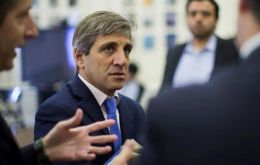
Argentina's central bank kept its key interest rate on Wednesday at 60%, one of the highest in the world, following a surprise hike two weeks ago after the peso plunged. Central bank officials said in a statement that inflation accelerated in August and continues to do so September, citing high-frequency data.
-
Wednesday, August 29th 2018 - 08:48 UTC
US dollar hits a new record in Argentina despite auctioning US$ 200 million
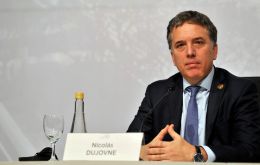
Argentina’s central bank auctioned a total of US$ 200 million of its reserves in two separate currency auctions on Tuesday after the peso hit new lows, the monetary authority said in a statement.
-
Wednesday, June 20th 2018 - 06:54 UTC
Argentine central bank contains run on the Peso, and major dumping of bonds

Argentine bonds touched their lowest levels of market-friendly President Mauricio Macri's term on Tuesday, but rebounded in a volatile trading session. Meanwhile the country risk (a measure of the difference between its bond yields and those issued by other countries) rose as much as 27 points to a 33-month peak.
-
Friday, June 15th 2018 - 06:56 UTC
Forex run in Argentina: Macri appoints new Central bank president

Argentine president Mauricio Macri appointed Finance Minister Luis Caputo as president of the central bank on Thursday, after the outgoing head of the bank resigned and acknowledged having lost credibility.
-
Thursday, May 24th 2018 - 08:44 UTC
Dollar/Peso challenge: Argentina offers to swap one-month Lebacs for long term papers
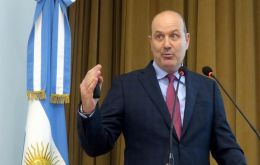
Argentina’s central bank moved on Wednesday to improve its debt profile by offering to swap some of its one-month Lebac securities for paper of longer duration, the bank said in a statement.
-
Wednesday, May 9th 2018 - 07:32 UTC
Peso storm: Argentina requests a US$ 30bn precautionary credit from IMF

Argentina asked the International Monetary Fund for financing to help stem a run from the Peso to the US dollar that is sparking a surge in interest rates and threatening to derail the country's economic recovery. The sum requested is estimated between 25 and 30bn dollars, 500% Argentina's IMF quota and could be disbursed in two forms, a flexible credit line or a precautionary credit line.
-
Friday, May 4th 2018 - 09:00 UTC
Argentine Peso tumbles 7.83% to US dollar; central bank raises rate to 33.25%
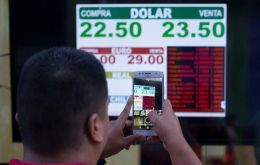
Argentina’s central bank raised its benchmark interest rate by 300 basis points to 33.25% percent on Thursday, but the second steep rate increase in less than a week failed to stop the country’s peso currency from swooning to a record low. The local currency tumbled 7.83% to 23 per U.S. dollar. It had hit 21.2 to the greenback on Wednesday, the first trading day due to a holiday after the bank hiked the rate to 30.25% from 27.25% on Friday.
-
Thursday, May 3rd 2018 - 08:39 UTC
Lack of investor confidence sees the Argentine Peso fall 3.11% against the dollar
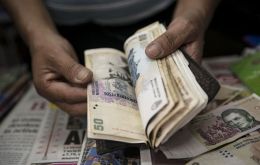
Argentina’s peso currency closed down 3.11% on Wednesday at an all-time low of 21.2 per U.S. dollar, even as the central bank continued selling dollars to try to halt the slide of the local currency, traders said. The currency’s sustained weakening showed a lack of investor confidence in Latin America’s third largest economy, which is blighted by one of the world’s highest inflation rates.
-
Wednesday, April 25th 2018 - 08:46 UTC
Argentina central bank holds benchmark rate at 27.25%; economy expands 4.7% in first two months
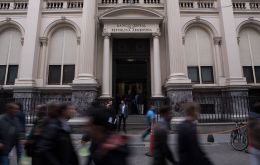
Argentina’s central bank held its benchmark interest rate at 27.25% on Tuesday, reiterating in a statement that high-frequency indicators suggested core inflation would remain high in April, but below March levels.
-
Wednesday, March 14th 2018 - 09:15 UTC
Argentina central bank leaves basic rate unchanged to combat inflation
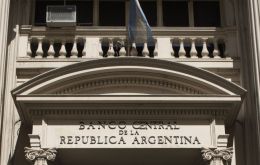
Argentina's central bank left the basic interest rate unchanged at 27.5%, a clear signal that inflation remains the main challenge of the country's monetary policy. The bank also revealed that last week it intervened in the local market with 400 million dollars to keep the US dollar in the range of 20/20,50 Pesos to the greenback.
